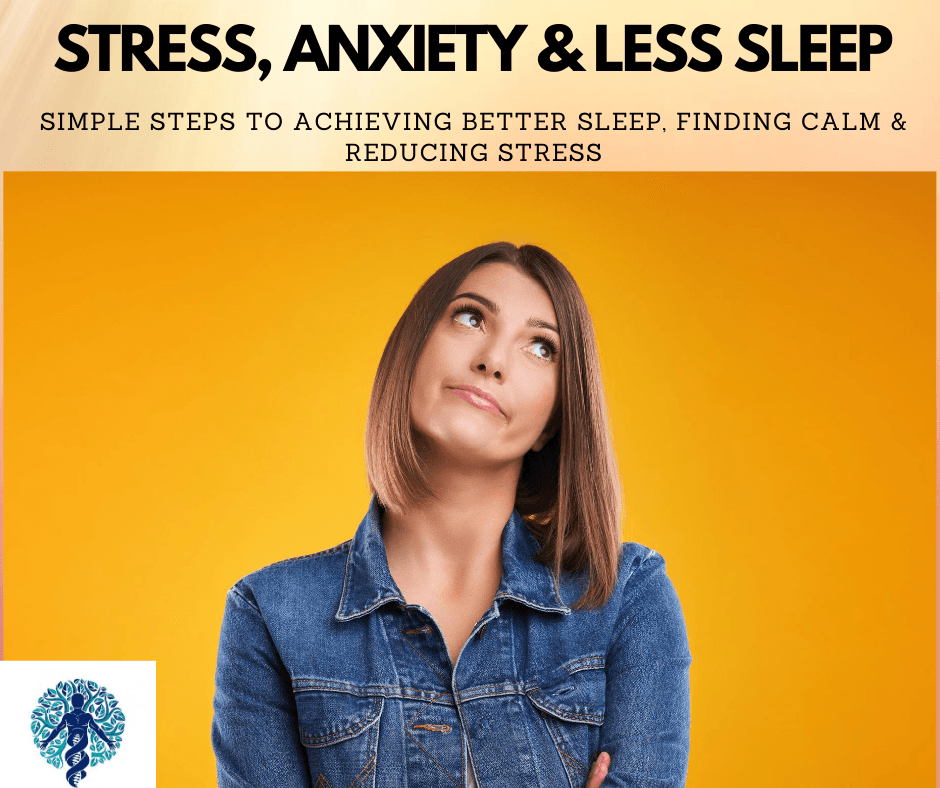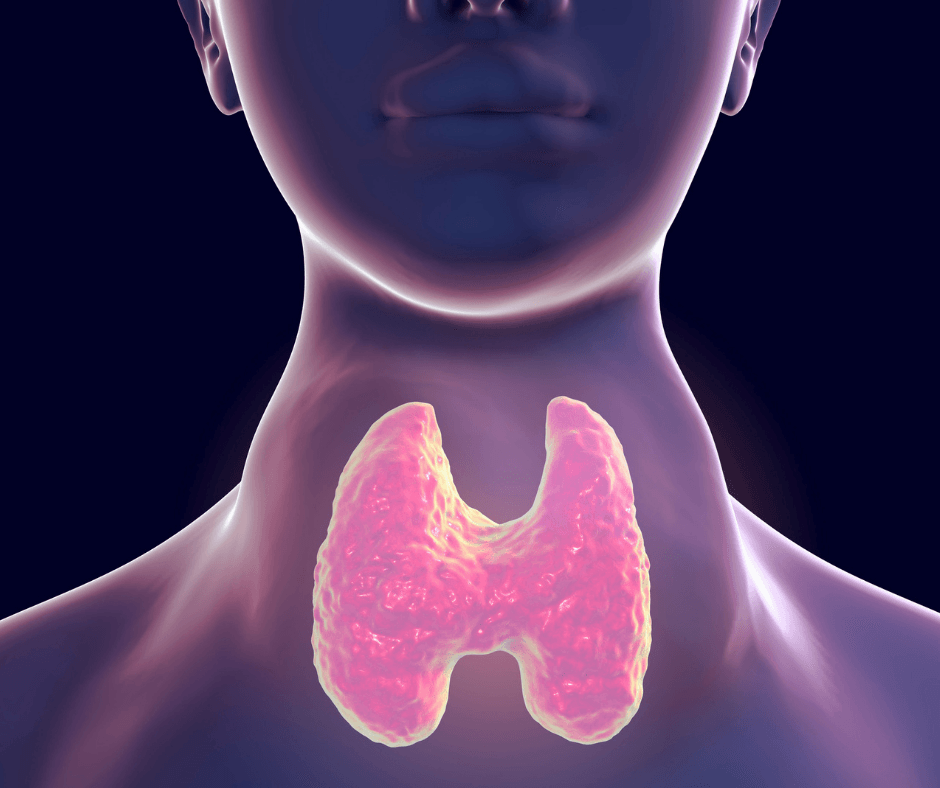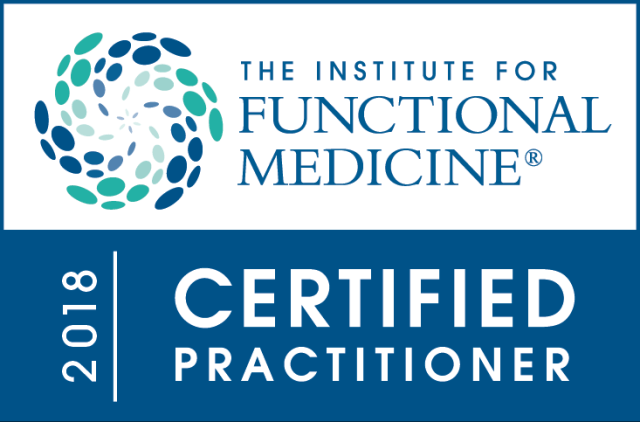Stress, Anxiety & Less Sleep
Simple Steps to Achieving Better Sleep, Finding Your Calm & Reducing Stress

This world can cause us to feel stressed, anxious and lose sleep. Did you know that there are steps you can take to cope with stress, find your calm and get a better night’s sleep?
Adrenal Health
Taking care of your adrenals is a necessary step in dealing with stress, anxiety and sleep.
Let’s talk a little about your adrenals, where they are located in your body and what their purpose is. Your adrenal glands are located on top of your kidneys and are composed of two parts: cortex and medulla. The adrenals produce certain hormones that are important to help regulate your metabolism, sleep/wake cycle, stress response and so much more!
Cortisol
is a steroid hormone produced by your adrenals.
- Controls sleep/wake cycle. Cortisol should be highest when you wake up in the morning and lowest when it is time to sleep at night.
- Released during times of stress to help increase energy and handle emergency situations. This is ideal if a big bear is chasing you!
- If your body is in constant fight or flight mode (otherwise know as the sympathetic nervous system), your adrenals are going to wear out! Why? Your body is not designed to live continuously in fight or flight mode! Your adrenals and body need a break!
- Cortisol alters non-essential body functions, which makes sense if you are in an emergency situation, you don’t need your body wasting energy on other bodily functions—you need to get away and survive! What are some of these functions that cortisol alters?
- Immune system responses
- Suppresses digestive tract
- Reproductive system
- Growth processes
- Can also communicate with brain regions that control mood, motivation & fear
- If you are constantly & chronically releasing cortisol it can be very disruptive to your body and put you at risk for:
- Anxiety and/or depression
- Sleep problems
- Digestive issues
- Heart issues
- Weight gain
- Issues with memory and/or concentration
So how can you support your adrenal health?
- Self care:
- 1️⃣ Eating a healthy, clean diet. Stay away from soda, foods with added sugars, box foods, foods that have ingredients that you can’t pronounce.
- 2️⃣ Relaxing
- 3️⃣ Resting/Getting enough good quality sleep
- 4️⃣ Taking time for movement
- Supportive Nutrients for Your Adrenal Health:
- 1️⃣ B complex . Foods high in B vitamins: fish, poultry, other meats, eggs, dairy products, leafy green vegetables such as spinach, beans and peas
- 2️⃣ Vitamin C. Foods high in vitamin C: Broccoli, brussel sprouts, cauliflower, leafy greens, sweet potatoes, citrus fruits and berries
- 3️⃣ Magnesium . Foods high in magnesium: almonds, spinach, cashews, peanuts, soy, black beans & avocado
- 4️⃣ Omega 3 Fatty Acids . Foods high in omega 3’s: cold water fatty fish such as salmon, mackerel, tuna, herring or sardines. Flaxseed, chia seeds or walnuts.
- 5️⃣ Zinc. Food highest in zinc are oysters. Other foods are beef, crab and pork.
Tips to cope with stress & feel less stressed and anxious:
- Take time for yourself daily! Schedule time daily and don’t ignore this on your calendar!
- Everyone has different ways of relaxing and taking time for yourself….Do what relaxes you! Is it reading a book? Is it sitting outside enjoying nature?
- Find your calm by performing breathing exercises such as 4-7-8 breathing , praying or meditating.
- Listen to music you enjoy that is peaceful.
- Movement or exercise. This should be enjoyable, it should not feel like a task or work!
- Get routine, quality sleep!
Let’s move onto Sleep! Are you getting enough quality sleep at night?
Why is sleep so important anyway?
- While you are sleeping, your body is repairing and replenishing itself:
- Healing or getting rid of damaged cells
- Boosting your immune system
- Recovering from the day’s activities
- Recharging/repairing your heart and cardiovascular system
- If you are not convinced yet that sleep is critical to your wellbeing, here are SIX more reasons:
- 1️⃣ Learning & Memory. Sleep helps the brain commit new info to memory.
- 2️⃣ Metabolism & Weight. Chronic sleep loss can cause weight gain by affecting the way your body processes and stores carbs and alters the level of hormones that affect your appetite.
- 3️⃣ Safety. Not getting enough sleep can contribute to greater tendency to fall asleep during the day. As an example, this would not be good if you are driving!
- 4️⃣ Mood. Not enough sleep can cause irritability, impatience, and/or moodiness.
- 5️⃣ Cardiovascular Health. High blood pressure and an irregular heart beat are more likely when you are not getting enough sleep.
- 6️⃣ Disease. Cancer and autoimmune diseases are more common in those that do not get enough sleep!
- Simple Steps to Get Quality Sleep:
- Support your adrenal health!
- Stick to a schedule. Go to bed at the same time and get up at the same time, even on the weekends.
- Watch your caffeine intake! How much caffeine are you consuming daily? How late are you consuming caffeine? Most recommendations are to stop caffeine intake by 2 PM.
- Avoid alcohol within 3 hours of bedtime. Most of you know that alcohol is a depressant, but it can also be a stimulant!
- Some medications and supplements may be stimulating.
- Try not to exercise at least 3 hours before bedtime.
- Limit screen time before bed (TV, smartphones, computers). Ideally, electronics should be turned off 2 hours before bed.
- Turn WiFi off at night.
- Avoid tension & anxiety before bed such as the news, stimulating activities, paying bills, eating large or spicy meals.
- Simple Ways to Feel Relaxed Before Bed:
- Fill your mind with positive thoughts such as “I can relax. I will be able to fall asleep easily.”
- Write in a gratitude journal about what you are thankful for.
- Perform breathing exercises, pray or meditate. 4-7-8 breathing is a fast and easy breathing exercise!
- Listen to peaceful music before bed.
- Having a schedule or relaxing routine before bed.
- Taking a bath with essential oils and/or epsom salts.
- Bedroom Environment for Optimal Sleep:
- Temperature should be cool (60-67 degrees Fahrenheit). Your body temperature naturally lowers at night, so a cool room helps to maintain your body’s natural rhythm.
- Quiet or white noise
- Dark
- Clutter free environment (clutter can cause anxiety).
Regular, good quality sleep will help you to cope with stress, feel less anxious and help your body to function more optimally!
If you are having trouble getting a good night’s rest or having other health issues and do not know where to begin, schedule a FREE 15 minute consult with New Beginnings. To schedule call 970-305-0101 or email at Staff@NewBeginningsFMC.com
References:
- https://www.hopkinsmedicine.org/health/conditions-and-diseases/adrenal-glands
- https://www.hormone.org/your-health-and-hormones/glands-and-hormones-a-to-z/hormones/dehydroepiandrosterone-dhea
- https://medlineplus.gov/bvitamins.html
- https://medlineplus.gov/ency/article/002404.htm
- https://ods.od.nih.gov/factsheets/Magnesium-HealthProfessional/
- https://ods.od.nih.gov/factsheets/Omega3FattyAcids-Consumer/
- https://ods.od.nih.gov/factsheets/Zinc-HealthProfessional/
- https://www.nhlbi.nih.gov/health-topics/sleep-deprivation-and-deficiency
- https://www.health.harvard.edu/press_releases/importance_of_sleep_and_health
- https://www.ncbi.nlm.nih.gov/pmc/articles/PMC5579396/
- https://www.mayoclinic.org/healthy-lifestyle/stress-management/in-depth/stress/art-20046037?p=1
- ifm.org
- https://www.sleepfoundation.org/articles/why-electronics-may-stimulate-you-bed


Dr. Shannon's Blog











